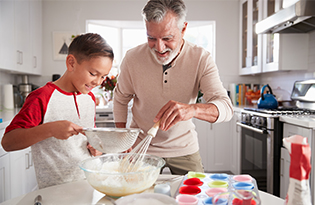Kids in the kitchen
2/25/2021 by Amanda Halls, R.D.N., L.D.

As a young child, I remember always wondering what was going on in the kitchen. It seemed to be the place to be, with all the commotion, sounds and smells.
One day, my dad propped me up on the counter beside him while cooking dinner, and I got to see firsthand what the fuss was all about. And I loved it.
From that day on, I was always in the kitchen — supervised, of course. I was the "official stirrer," mixing up everything from cookie batter to sauces on the stove. As I grew older, my responsibilities changed. I learned how to cut foods like a chef and make my grandmother's recipes.
If your kids are interested in cooking — even from an early age — involve them in the kitchen.
During the COVID-19 pandemic, you and your children may be spending more time at home. Instead of playing video games, get them in the kitchen. It's a place to bond, learn and create.
Start by involving your little sous-chef. It's also a great way to help your kids expand their food choices. The more children are involved in the process, the more likely they will want to try different foods other than pizza or chicken nuggets.
Here are a few guidelines for various ages and education levels:
- Toddlers with supervision
Younger children can help out in the kitchen. Being involved makes them feel as though they are part of something special. Give them the opportunity to do simple and safe tasks, such as pouring measured ingredients into a bowl. Allow them to watch and learn at the same time. - Kindergarten and first graders with direct supervision
Ask them to measure items using a measuring cup, simultaneously developing great hands-on math skills; wash fruits and vegetables; and hand-mix items that are not sticky in a large bowl. - Second and third graders with supervision
If you feel comfortable as a parent, this age group can try peeling vegetables, grating cheese and mixing sticky items in bowls. - Fourth and fifth graders with supervision
Start using a can opener, stirring stovetop items, pounding chicken and scraping bowls. - Sixth and seventh graders with limited supervision
If you feel comfortable as a parent, this age group can start using a knife and being more independent with cooking after instruction, and proving they are capable and safe.
Remember, children's skills will differ, so you will need to decide what you feel comfortable letting them try in the kitchen. Starting children at a young age can help them develop culinary skills that can last a lifetime. You might be surprised at what your children can do.
Amanda Halls, R.D.N., L.D., is a dietician at Mayo Clinic Health System in Lake City, Minnesota.
